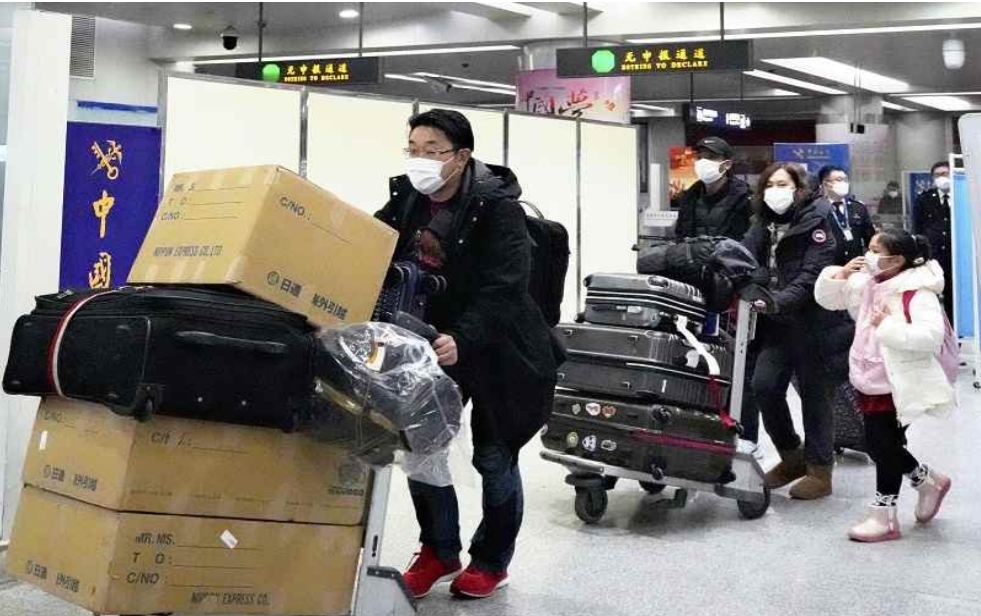Saving face means more to China than economic recovery

Ichiro Ohara / The Yomiuri Shimbun
Passengers on a flight from Narita Airport arrive at the international airport in Tianjin, China, on Sunday.
The Yomiuri Shimbun
China has put its dignity or face, known as “mianzi” in Chinese, ahead of economic recovery.
Not only has China suspended the issuance of visas to Japanese and South Korean nationals in retaliation for stricter entry requirements by Japan and South Korea for arrivals from China, but Beijing also announced Wednesday that it would stop allowing visa-free transit for them.
The restoration of the normal flow of people between China and neighbors Japan and South Korea has been pushed further away by Beijing’s moves.
Just recently, China had scrapped its border control measures along with the end of its zero-COVID policy.
Chinese Foreign Minister Qin Gang justified the visa issuance suspension during his visit to Ethiopia on Wednesday. Qin said that discriminatory measures against travelers from China caused obstacles to personnel exchanges to and from the country, giving Beijing reason to counter those measures.
China’s National Immigration Administration announced the same day that it would suspend visa-free stopovers in China of between 72 hours and 144 hours granted to Japanese and South Korean citizens heading to a third nation.
For Chinese President Xi Jinping’s administration, which had boasted the superiority of its zero-COVID policy, faith could be lost if Chinese nationals were restricted from entry to nations such as Japan at the very time Beijing has scrapped its border restrictions.
Kanda University of International Studies Prof. Ichiro Korogi said China wants to “foment public opinion blaming countries that impose restrictions against China.”
On Chinese social media platform Weibo on Wednesday, a series of comments posted supporting the government could be found.
Prime Minister Fumio Kishida told reporters Wednesday during his visit in London, “It is extremely regrettable that China unilaterally imposed restrictions on visa issuance that seemingly have nothing to do with measures against the novel coronavirus.”
Since the end of last year, Japan has been strengthening border control measures such as virus tests for arrivals from China but has not imposed any restrictions on visa issuance.
Japan is protesting China’s response, with a Foreign Ministry official saying the measures “have no legal basis and are incomprehensible.”
Tokyo protested Beijing’s suspensions through diplomatic channels, demanding that they be lifted.
Japan is likely to keep strengthening its COVID border control measures for arrivals from China until at least the end of the major Chinese New Year holiday season, which this year is centered on Jan. 22.
The timing of the easing of Japan’s measures is expected to be determined based on the infection situation and information disclosure in China.
Business circles alarmed
If prolonged, China’s suspension of visa issuance will likely affect Japanese companies.
The Japanese Chamber of Commerce and Industry in China held a board meeting Wednesday in Beijing, where executives from about 70 Japanese companies discussed how to respond to the situation. They agreed to make a request to the Chinese government if visa issuance to Japanese nationals was not resumed after the Chinese New Year holidays from Jan. 21-27.
JCCIC Chairman Yoichi Ikezoe, who is also chairman of Itochu (China) Holding Co., told The Yomiuri Shimbun that even during the zero-COVID policy, “People were able to enter China if they followed the prescribed procedures, so the situation will become more serious if the suspension is prolonged.”
Many Japanese expatriates are transferred on April 1, the start of the fiscal year in Japan, and the working visa application process has been in full swing since the beginning of the year.
“If the suspension is prolonged, it may affect personnel transfers in spring,” said an official of a major Japanese retailer with stores in China.
Beijing’s abolition Sunday of the mandatory five-day COVID-related quarantine have prompted many Japanese businesspeople to prepare to resume trips to China again.
“Now we won’t be able to travel to assess Chinese firms’ assets,” said an employee in charge of M&A in China at a leading Japanese securities firm. “We fear M&A negotiations will break down.”
The airline and travel industry also has a strong sense of crisis.
Japan Airlines and All Nippon Airways currently offer 27 round-trip flights between Japan and China per week, about 10% of the number from the pre-pandemic era. China’s latest measures are feared to cause delays in their plans to resume routes or increase flights.
A spokesperson of a major travel agency said the company is concerned that it might dampen overall demand for overseas travel from Japan.




